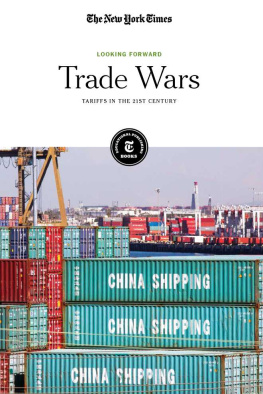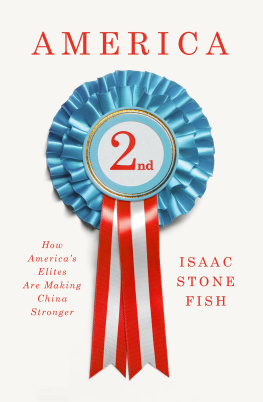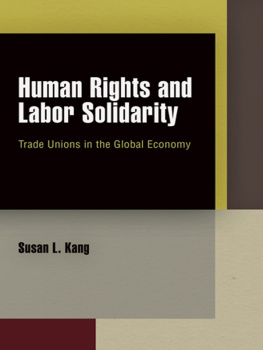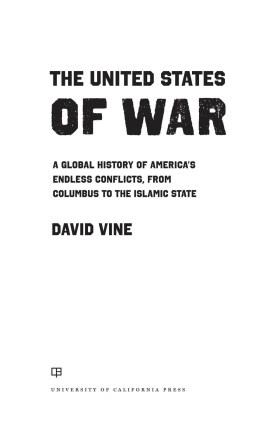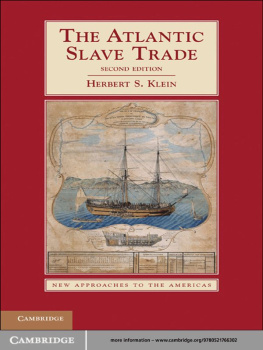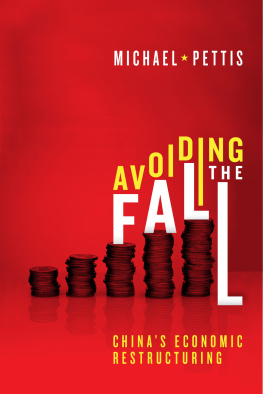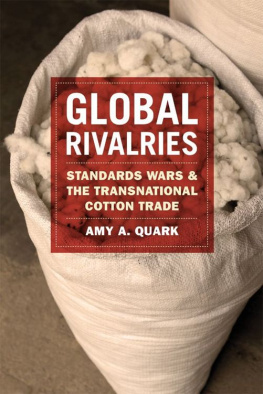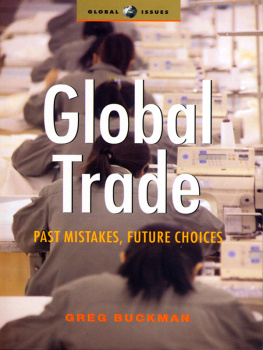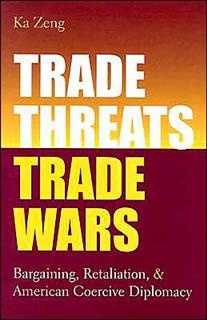Acknowledgments
T his book is a joint project between two authors who live six thousand miles aparta genuinely transpacific partnership between San Francisco and Beijing. Although the finished product is ours, much of it was informed by the accumulated insights and talents of others. Like so much else in the modern global economy, our book would not have been possible without the contributions of people around the world.
Matt would like to begin by thanking the teachers who taught him how to write and think critically long before entering journalism, particularly Earl Bell, Ted Bromund, David Bromwich, and Donald Kagan. Their influence has been invaluable throughout his career. Matt would also like to thank his former Bridgewater colleagues for teaching him economics and finance, as well as for introducing him to Michaels writings on China and the balance of payments.
Michael would like to thank the brilliant Peking University students in his central bank seminar with whom he has discussed these and other issues many times and who force him to understand the basics.
Matt would like to thank the Marjorie Deane Financial Journalism Foundation for giving him his start as a writer with an internship at the Economist. He has been fortunate to have had many excellent mentors and editors over the years, including Ryan Avent, Clive Crook, Cardiff Garcia, James Greiff, Brian Hershberg, Greg Ip, Izabella Kaminska, Zanny Minton-Beddoes, and Robert Sabat. Matt would particularly like to thank Sebastian Mallaby, who, almost a decade ago, hired Matt as a research assistant to work on a biography of Alan Greenspan. Sebastian encouraged Matts ambitions at a time when becoming a writer seemed like the worst possible way to earn a living. He has always been a valuable source of advice on career decisionsespecially the decision to write this book.
Preparing the proposal and finding the right publisher were not easy. In addition to Sebastian, we thank Tim Harford, Anna Pitoniak, Reihan Salam, Amir Sufi, and Martin Wolf, who were all incredibly generous with their suggestions and personal introductions.
Yale University Press has been a joy to work with. We would like to thank Seth Ditchik, Laura Jones Dooley, Dorothea Halliday, Kristy Leonard, Karen Olson, and Margaret Otzel for their support and guidance throughout the process. We also thank the anonymous reviewer, who provided useful suggestions for improving the manuscript. Bill Nelson transformed Matts Excel spreadsheet into elegant illustrations.
Many ideas in this book are the product of conversations with others. Although many people contributed to our thinking, we especially thank Robert Aliber, Kenneth Austin, Ed Conway on Bretton Woods, Brad Delong, Niall Ferguson, Jacob Feygin, Marcel Fratzscher on Germany, Cardiff Garcia, Ambassador Jorge Guajardo, Stephanie Kelton, the formidable Wall Street veteran Robert Kowit, George Magnus, Sebastian Mallaby, Atif Mian, Julio Mota, Christian Odendahl, Zoltan Pozsar, Dani Rodrik, Reihan Salam, Martin Sandbu, Karthik Sankaran, Brad Setser, Hyun Song Shin, Amir Sufi, Srinivas Thiruvadanthai, Adam Tooze, Kellee Tsai on Chinas informal banks, Angel Ubide, Duncan Weldon, Martin Wolf, and Gabriel Zucman.
Brad Setser and Harry X. Wu also generously provided us with their data on Chinas manufacturing trade, global foreign reserve accumulation, and Chinese productivity. During our many meetings at the International Monetary Fund office in Beijing, our host, Alfred Shipke, along with Logan Wright, Rodney Jones, and Chen Long, spent hours agreeing or disagreeing about the evolution of the Chinese economy, from which Michael stole many of our best ideas.
Suggestions and critiques from Christian Odendahl and Adam Tooze improved the chapter on Germany and Europe immensely. Cardiff Garcia and Sebastian Mallaby provided valuable input on the introduction, the chapter on the role of the dollar in the global financial system, and the conclusion. Ed Eyerman and a Peking University professor who prefers not to be named read through the whole book and gave great advice, and Shenglong Tian was a great help through revision after revision. Matts parents, Andrew and Lisa, and Matts wife, Frances, each read the entire manuscript, including multiple versions of certain sections. Their questions and edits were essential.
One of the themes of this book is that choices made in one place can have unexpected effects elsewhere. Matt decided to work on a book without taking time off from his day job, and Frances felt the consequence of having a husband who was busy on countless nights, weekends, and early mornings. He is grateful to her for her understanding and support.
ONE
From Adam Smith to Tim Cook
The Transformation of Global Trade
I nternational trade used to be simple. High transport costs and politically imposed constraints limited the flow of finished goods and raw materials across borders. In the late eighteenth and early nineteenth centuries, British thinkers argued for removing tariffs and other barriers to encourage specialization, while Americans and Germans proposed protecting infant industries to develop diversified domestic markets. The end of the Napoleonic Wars, the mass deployment of steam engines, and the invention of the telegraph led to a boom in trade until the early 1870swhich ended with what some have called the worlds first synchronized global financial crisis, the Panic of 1873. From the late 1880s until World War I, high imperialism in the late nineteenth and early twentieth centuries led to increased trade within larger blocs even as it limited trade between them.
World wars, the Great Depression, and revolutions upended the political and economic order in the first half of the twentieth century. Initially, the impact was to crush international trade to its lowest level since the late eighteenth century, although these events also caused a massive redistribution of wealth that left income more equally distributed within the rich countries than it had ever been. Eventually, these forces created space for much deeper economic integration.
Even then, most trade at the time consisted of finished goods and commodities. The innovation of container shipping radically lowered transportation costs while advances in communications technology made it easier to oversee factories on the other side of the world. By the late 1990s, trade had been transformed. Companies spread complex manufacturing supply chains across multiple countries to maximize efficiency and minimize taxes. Trade today looks nothing like it did before. Unfortunately, in spite of all these changes, the popular understanding of trade continues to be based on obsolete eighteenth-century models.
Pins, Cloth, and Wine
Adam Smiths Inquiry into the Nature and Causes of the Wealth of Nations opens with an account of a pin factory. Smith estimated that it took eighteen distinct operations to make a single pin. Just making the head required two or three distinct operations. One worker would be hard-pressed to make more than a few dozen pins in a day if he were forced to perform all the steps himself. What the pin-makersand Smithrealized was that each worker became thousands of times more productive by focusing on specific parts of the process.
Pin-making in Smiths day took place in a single building, but it can be understood as a series of trade relationships: the factory owner buys raw materials from suppliers, after which the first worker effectively buys some of the materials from the factory owner and makes the first set of improvements, preselling this unfinished good to the next worker, who makes more improvements before selling the modified good to yet another worker. The last worker in the chain ends up with finished pins ready to be sold to distributors. While businesses exist to simplify these implied transactions between employees and owners, Smiths insightpeople accomplish more when they specializeexplains why pin-makers did not forge their own steel, much less mine their own iron and coal. All of these separate businesses trade with each other for what they need while focusing on how they can add the most value.


